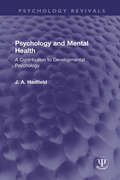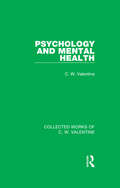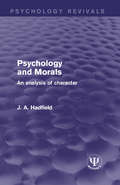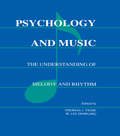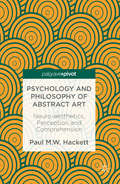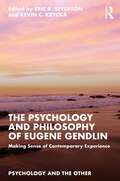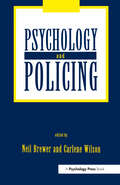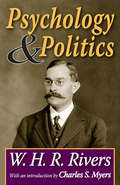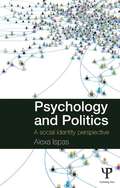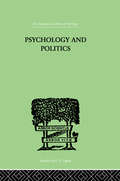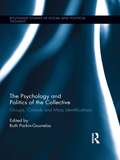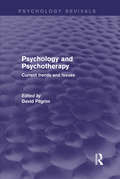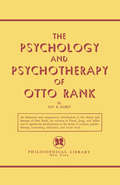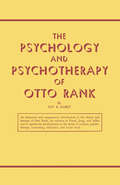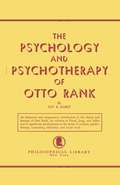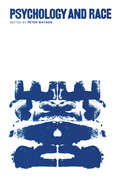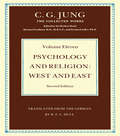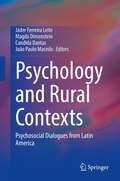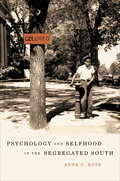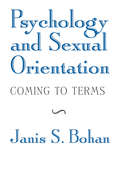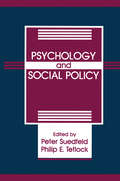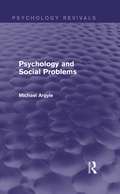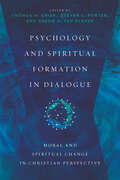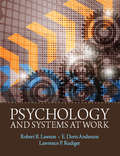- Table View
- List View
Psychology and Life
by Philip G. ZimbardoThe classic text that defined the field, Psychology and Life, Fifteenth Edition, celebrates Phil Zimbardo's 30th anniversary as its author by returning to its original themes: presenting psychology as a science and as a tool to understanding our daily lives. The book continues to provide a rigorous, research-centered survey of the discipline while offering students features and pedagogy that will spark their interest and excite their imaginations.
Psychology and Mental Health: A Contribution to Developmental Psychology (Psychology Revivals)
by James Arthur HadfieldFirst published in 1950, Psychology and Mental Health describes the origin of behaviour disorders and the psychoneuroses especially as regards their causes in early childhood. Most psychologists agree that such disorders as hysteria, sex perversion, the obsessions and anxiety states, as well as many behaviour disorders and delinquencies, find their roots in childhood experiences. If this is the case it should be possible to prevent them from developing into full-blown neurotic disorders which may take years to cure. The purpose of this book is to describe the early causes of these disorders with a view to their treatment, but more particularly with a view to their prevention. As mental health is the concern not only of the doctor but of the parson and the priest, of the teacher and the parent, this book is written in non-technical language as far as the demands of accuracy will allow. It embodies the result of over thirty years’ experience in the treatment of patients suffering from these disorders, and the views here maintained, which differ somewhat from the other analytic schools, are illustrated with clinical examples throughout. This book is a reissue originally published in 1950. The language used reflects its era and no offence is meant by the Publishers to any reader by this republication.
Psychology and Mental Health (Collected Works of C.W. Valentine)
by C.W. ValentineOriginally published in 1948, this book deals, in a non-technical way, with such topics as Worry and Conflict; Repressions, Irritability and Complexes; Depression, Inferiority and Loneliness; Suggestion and Auto-Suggestion. Each topic is illustrated by reports of actual cases. A series of broadcast talks on these subjects by the author (given in 1946) were so widely appreciated, and so many requests for publication were made, that the talks were expanded and revised so as to be more suitable for reading. Discoveries of the wide prevalence of minor neuroses at the time had led to an increased interest in the subject and the demand for simple exposition. It was also thought that some popular illusions should be dispelled. The talks were designed not only to explain some common mental disorders, but to help some of those numerous individuals who were struggling with difficult mental situations, or were often lonely and depressed.
Psychology and Morals: An Analysis of Character (Psychology Revivals)
by J. A. HadfieldOriginally published in 1923, this book had enjoyed constant and wide success, being reprinted fourteen times. In this new and thoroughly revised edition, published in 1964, the author has reconsidered his conclusions in the light of modern psychology of the time, and includes many case histories from his long experience as a psychiatrist. The book was important for its insistence that there is no intrinsic conflict between analytical psychotherapy and ordinary moral behaviour.
Psychology and Music: The Understanding of Melody and Rhythm
by Thomas J. Tighe W. Jay DowlingThis book deals with the complex cognitive processes involved in understanding two "horizontal" aspects of music perception, melody and rhythm, both separately and together. Focusing on the tonal framework for pitch material in melodies, the first section provides evidence that mere exposure to music organized in a particular way is sufficient to induce the auditory system to prepare itself to receive further input conforming to the patterns already experienced. Its chapters also offer evidence concerning elaborations of those basic schemes that come about through specialized training in music. Continuing themes from the first section -- such as the hypothesis that melodies must be treated as integral wholes and not mere collections of elements -- the second section discusses the integration of melody and rhythm. In these chapters there is an underlying concern for clarifying the relation -- central to aesthetic questions -- between physical patterns of sound energy in the world and our psychological experience of them. The chapters in the third section provide excellent examples of the new, scientific literature that attempts to objectively study early musical abilities. Their data establish that infants and young children are far more perceptive and skilled appreciators of music than was thought a decade ago.
Psychology and Philosophy of Abstract Art
by Paul M.W. HackettThis book examines how we perceive and understand abstract art in contrast to artworks that represent reality. Philosophical, psychological and neuroscience research, including the work of philosopher Paul Crowther, are considered and out of these approaches a complex model is developed to account for this experience. The understanding embodied in this model is rooted in facet theory, mapping sentences and partially ordered analyses, which together provide a comprehensive understanding of the perceptual experience of abstract art.
The Psychology and Philosophy of Eugene Gendlin: Making Sense of Contemporary Experience (Psychology and the Other)
by Eric R. Severson Kevin C. KryckaThis book brings together a collection of essays written by scholars inspired by Eugene Gendlin’s work, particularly those interested in thinking with and beyond Gendlin for the sake of a global community facing significant crises. The contributors take inspiration from Gendlin’s philosophy of the implicit, and his theoretical approach to psychology. The essays engage with Gendlin’s ideas for our era, including critiques and corrections as well as extrapolations of his work. Gendlin himself worried that knowing about a problem is too often conflated with actions that might lead to change; the essays in this book point to a form of understanding that is activated, an embodied and immediate way of thinking about today’s problems. Throughout the volume, the contributors creatively engage with Gendlin’s work and its applicability to the complex, pressing crises of our time: the Covid-19 pandemic, environmental/climate issues, racism, sexism, economic inequality, and other factors threatening human persons and communities. Gendlin’s theoretical approach to psychology is naturally interdisciplinary, making this book an essential read for anyone interested in moving to the boundaries where psychology meets philosophy, theology, art, environmental studies, science, technology, and much more.
Psychology and Policing
by Neil Brewer Carlene WilsonPsychological theory and research have much to contribute to the knowledge and skill bases underlying effective policing. Much of the relevant information, however, is dispersed across a variety of different psychological and criminal justice/policing journals and seldom integrated for those applied psychologists interested in policing issues or for police policymakers/administrators and others working in the criminal justice area who are not familiar with the psychological literature. Designed to accommodate the needs of these different groups, this book addresses both operational policing issues and issues relevant to the improvement of organizational functioning by providing integrative reviews of psychological theory and research that deal with effective policing. It illustrates how the theory and research reviewed are relevant to specific policing practices. These include eyewitness testimony, conflict resolution, changing driver behavior, controlling criminal behavior, effective interviewing, and techniques of face reconstruction. The volume's readable style makes it accessible to a diverse audience including undergraduate and postgraduate students in forensic/organizational/applied psychology, criminal justice, and police science programs, and police administrators and policymakers. It will also interest psychologists whose primary focus includes policing and criminal justice issues. The book should draw attention to the often unrecognized and valuable contribution that mainstream psychology can make to the knowledge base underpinning a wide variety of policing practices.
Psychology and Politics
by Leston HavensIn applying psychology to the field of politics, the eminent British anthropologist and psychologist W.H.R. Rivers deals with social or collective psychology rather than with the psychology of the individual. This choice presents a number of problems. These include the relation between individual and collective psychology, the concept of a collective or group mind, and the question of how far society can be regarded as an organism. The choice also presents the need to explain the fact that when a number of individuals act together, the product of their combined activity is not the same as what might have emerged from the separate activity of individuals. Rivers' belief in the political process prompted him to deliver the lectures on psychological theory that are printed in this volume. Three other addresses are also included in this volume, one on socialism and human nature, another on education and mental hygiene, and a lecture on the aims of ethnography. Rivers considered the relation between psychology and sociology, putting forward the position that the formulation of an adequate science of social psychology lies in the observation of social conduct, including not merely the social conduct of everyday life, but still those forms of it which are subsumed under the headings of religion, economics, and politics, as well as the social institution of language. The social behavior of mankind is capable of being studied as a methodological principle, independently of the psychological basis of behavior.
Psychology and Politics: A Social Identity Perspective
by Alexa IspasWhat makes us divide the world into ‘us’ and ‘them’? How can we exert social influence over others? When does a peaceful protest turn into a riot? Why are some politicians heroes one day and villains the next? Where do we find the resources to resist authoritarian regimes? Taking these questions as a starting point, the book examines political conduct from a social identity perspective. Supported by over two decades of empirical research, this perspective distinguishes between our personal identity, which is prevalent when we think of ourselves as individuals, and our social identity, which comes to the fore when we think of ourselves as members of groups. The social identity perspective argues that our political behaviour is largely governed by our social identity, and discusses the implications this has for politics, particularly for social influence, crowd events, leadership, and authoritarian regimes. Accessible and engaging, the content covers a wide range of political topics, such as the way in which categorizing ourselves into groups influences how we perceive the social world, the implications of categorization for social influence, the development of crowd events, the dynamics of leadership, and the mechanisms underlying obedience under authoritarian regimes. The book will appeal to advanced undergraduate and postgraduate students across a range of disciplines, as well as to political activists and leaders.
Psychology and Politics: And other Essays (International Library Of Psychology)
by Rivers, W H RFirst published in 1999. Routledge is an imprint of Taylor & Francis, an informa company.
The Psychology and Politics of the Collective: Groups, Crowds and Mass Identifications (Routledge Studies in Social and Political Thought)
by Parkin-Gounelas RuthWhat are the psychological factors in operation when we form groups or crowds, and how are these affected by socio-historical circumstances? History offers endless examples of different forms of human collectivity, both private and public, small-scale and large: from the primal horde to the modern nuclear family, from the Athenian polis to virtual internet communities. Within the context of shifting social bonds in global culture, this book brings together debates on the left from political philosophy, psychoanalysis, social psychology and media and cultural studies to explore the logic of the formation of collective identities from a new theoretical perspective. Challenging liberal-capitalist models of individualism, as well as postmodern identity politics, analysts here turn to Continental philosophy (Lacan, Derrida, Agamben, Laclau, Badiou, among others) in order to re-think collectivity in relation to questions of agency, alterity, affect, sovereignty, the national imaginary and the biopolitical. In the aftermath of the great mass movements of the twentieth century (Marxist-Leninism, Mao), which resulted in bureaucratic submission and the cult of the State, the fate of our collective identity today raises urgent questions about the future of collaborative activity, the role of mediating institutions in shaping mass psychology, what is at stake in a radical democracy, and what happens in a crowd.
Psychology and Psychotherapy: Current Trends and Issues (Psychology Revivals)
by David PilgrimOriginally published in 1983, fifteen well-known psychologists and psychotherapists write about their personal interests to give the reader a vivid picture of the complexities of psychotherapy in Britain at the time. They explore aspects of the interaction and intersection of the psychological and psychotherapeutic worlds, paying particular attention to the practical and theoretical controversies involved in this overlap. The first half of the book concerns itself with problems of theory and practice in psychology and psychotherapy, while the second half deals with professional conflicts and political issues impinging upon the practice of psychotherapy by psychologists. Areas of concern and controversy that are scrutinised include the problematic relationship between academic psychology and psychotherapy; doubts and certainties in psychotherapy; the psychology of helping; the relevance of the psychodynamic tradition; inter-professional disputes; women and psychotherapy; and social class issues in psychotherapy.
The Psychology and Psychotherapy of Otto Rank
by Fay B. KarpfOtto Rank, an Austrian psychologist, was a protégé of Sigmund Freud who saw in young Rank a gifted mind and drew him into his inner circle. The Psychology and Psychotherapy of Otto Rank is author Fay B. Karpf's historical and comparative introduction to the theory and therapy of Otto Rank, his relation to Freud, Jung, and Adler, and to significant developments in the fields of analysis, psychotherapy, counseling, education, and social work.
The Psychology and Psychotherapy of Otto Rank: Science And Philosophy, The Psychology And Psychotherapy Of Otto Rank, And Dictionary Of Hypnosis
by Fay B. KarpfThis authoritative study of psychologist Otto Rank covers his groundbreaking work, as well as his connections to Freud, Jung, and others. Austrian psychologist Otto Rank is one of the most influential figures in modern psychotherapy. A protégé́ of Sigmund Freud, he made significant developments in the fields of analysis, psychotherapy, counseling, education, and social work. In The Psychology and Psychotherapy of Otto Rank, social psychologist Fay B. Karpf—who studied with Rank—presents an authoritative analysis of his pioneering work. This historical and comparative introduction to Rank&’s theory and therapy explores his prolific writings, his work with patients, and his relation to Freud and Jung, as well as Alfred Adler and other major figures of the Neo-Freudian school.
The Psychology and Psychotherapy of Otto Rank: An Historical and Comparative Introduction
by Fay B. KarpfOtto Rank, an Austrian psychologist, was a protege of Sigmund Freud, who saw in young Rank a gifted mind and drew him into his inner circle. The Psychology and Psychotherapy of Otto Rank is author Fay B. Karpf s historical and comparative introduction to the theory and therapy of Otto Rank, his relation to Freud, Jung, and Adler and to significant developments in the fields of analysis, psychotherapy, counseling, education, and social work. Fay B. Karpf was one of the earliest Jewish American woman sociologists. Born in Austria in 1893, Karpf eventually immigrated to the United States, where she attended the University of Chicago. She immersed herself in the Chicago School of Sociology, and her first book, American Social Psychology: Its Origins, Development and European Background (1932), was a standard textbook in the field of social psychology. She studied with the psychoanalyst Otto Rank, and she later taught social work at the Training School for Jewish Social Work in New York. After the school unfortunately closed, Karpf moved with her husband to Los Angeles, where she became a practicing counselor and psychotherapist, and she continued contributing to the fields until her death in 1981.
Psychology and Race
by Peter WatsonSince the problems of race relations are worldwide, the international origins and perspectives of this excellent and timely book are especially advantageous. More research has been done in the United States than elsewhere on the psychology of race relations, so it is appropriate that a plurality of the chapters of this book are by American authors--a stellar group that includes leading contributors to our contemporary knowledge of the topic. Contributors from the English-speaking Commonwealth countries are next in number, followed by authors from the United Kingdom, where race-related issues have only recently become a salient concern of politics and social ethics. The editor has assigned topics to his carefully chosen author-experts not by country or region, but by matching the expertise of each author against a need for coherent analysis of the important aspects of aepsychology and race.'Psychology and Race is divided into two major parts. The first half of the book looks at the interracial situation itself. The first section concentrates on the majority or dominant group, and describes the development and measurement of racial awareness and prejudice and techniques for reducing prejudice; the second section focuses on the reactions of subordinate or minority groups; and the third deals with specific aspects of interpersonal interaction-attitudes, behavior, and performance--when the people concerned are of different races. The book also looks at those areas of life where race is relevant and where psychology can help in an understanding of the situation.The scope of this volume, the distinction of its authors, and the hardheaded sense of reality it brings to the discussion of these extremely complex issues will make it an invaluable resource not only for teachers and students but also for everyone concerned in any way with this most pressing issue of our times.
Psychology and Religion Volume 11: West and East (Collected Works of C.G. Jung #50)
by C.G JungSixteen studies in religious phenomena, including Psychology and Religion and Answer to Job.
Psychology and Rural Contexts: Psychosocial Dialogues from Latin America
by Jáder Ferreira Leite Magda Dimenstein Candida Dantas João Paulo MacedoThis book brings together a selection of theoretical reflections, empirical researches and professional experiences to showcase the increasing production of psychological studies in rural contexts developed in Latin America in recent years. Psychology’s tradition of science and eminently urban profession has produced a void of reflections and approaches on important actors of the societies that constitute their existence in rural contexts and in relation – whether of integration, conflicts and contradictions – with urban agents. But a new generation of psychologists are turning their attention to rural contexts, especially in Latin America. This volume aims to present a selection of these psychological studies and interventions developed in rural contexts from a psychosocial and interdisciplinary perspective, developed together with various social actors who live and work in rural spaces, that have an important relationship with land and nature both in terms of the elaboration of their history, the production of their subjectivities and identity ties with the territory, and the engagement in struggles for the right to land and for public policies that guarantee access to education and health services, technical assistance and infrastructure for its working activities. The book is divided in five parts, each one dedicated to a dimension of psychosocial studies and interventions in rural contexts: theoretical approaches; mental health and rural populations; social movements, communities and resistance practices; gender relations and subjectivation processes; and environment and sustainability. Chapters in each axis prioritize reports of experiences and research conducted with participatory approaches, producing new perspectives and reflections that contribute to the advancement of knowledge in the field of psychology, both regionally and globally.
Psychology and Selfhood in the Segregated South
by Anne C. RoseIn the American South at the turn of the twentieth century, the legal segregation of the races and psychological sciences focused on selfhood emerged simultaneously. The two developments presented conflicting views of human nature. American psychiatry and psychology were optimistic about personality growth guided by the new mental sciences. Segregation, in contrast, placed racial traits said to be natural and fixed at the forefront of identity. In a society built on racial differences, raising questions about human potential, as psychology did, was unsettling. As Anne Rose lays out with sophistication and nuance, the introduction of psychological thinking into the Jim Crow South produced neither a clear victory for racial equality nor a single-minded defense of traditional ways. Instead, professionals of both races treated the mind-set of segregation as a hazardous subject. Psychology and Selfhood in the Segregated Southexamines the tensions stirred by mental science and restrained by southern custom. Rose highlights the role of southern black intellectuals who embraced psychological theories as an instrument of reform; their white counterparts, who proved wary of examining the mind; and northerners eager to change the South by means of science. She argues that although psychology and psychiatry took root as academic disciplines, all these practitioners were reluctant to turn the sciences of the mind to the subject of race relations.
Psychology and Sexual Orientation: Coming to Terms
by Janis S. BohanPsychology and Sexual Orientation strives to "come to terms" with lesbian, gay and bisexual life and with the controversial scientific and sociocultural theories and arguments on the origin and meaning of homosexuality and queer life in the US. Janis M. Bohan disrupts conventional psychological perspectives on queer life and identity and animates the ongoing debate between essentialism and constructionism. Bohan discusses the meaning of sexual orientation; lesbian, gay and bisexual identity development and stigma management; diversity in experiences; partners and parenting; and lesbian, gay and bisexual communities.
Psychology And Social Policy
by Peter Suedfeld Philip E. TetlockThis work explores the application of psychological data and theories to controversial policy issues such as racial and gender inequality, violence and criminal justice. The book also asks whether psychology really has relevant expertise to contribute. First published in 1992. Routledge is an imprint of Taylor & Francis, an informa company.
Psychology and Social Problems (Psychology Revivals #Volume 2)
by Michael ArgyleFirst published in 1964, Psychology and Social Problems looks at a changing society and research into problems of the time. Many of the themes in the book, such as delinquency, mental health and racial conflict, are still familiar and current topics of discussion today. Social scientists had carried out extensive research into problems of urgent public concern, yet their findings were not widely known or understood and they had often been diffident in advocating policies based on their conclusions. Michael Argyle discussed the recent psychological and social research bearing on the origins of aggression, delinquency, mental disorder, racial and international prejudice, and industrial discontent; he went on to consider the implications of these studies for prevention and control and for the guidance of social change. This sophisticated and well-documented critique is presented with such lucidity and verve that it will appeal equally to laymen and to students and professional workers and can now be enjoyed in its historical context.
Psychology and Spiritual Formation in Dialogue: Moral and Spiritual Change in Christian Perspective (Christian Association for Psychological Studies Books)
by Thomas M. Crisp Steven L. Porter Gregg A. Ten ElshofCan the phenomena of the human mind be separated from the practices of spiritual formation—of growing to have the mind of Christ? Research into the nature of moral and spiritual change has revived in recent years in the worlds of psychology on one hand and theology and philosophy on the other. But psychology and spiritual formation draw upon distinct bodies of research and theory grounded in different methodologies, resulting in conversation that has suffered from a lack of interdisciplinary cross-pollination. Rooted in a year-long discussion held by Biola University's Center for Christian Thought (CCT), this volume bridges the gaps caused by professional specialization among psychology, theology, and philosophy. Each essay was forged out of an integrative discussion among theologians, psychologists, philosophers, New Testament scholars, educators, and pastors around the CCT seminar table. Topics that emerged included relational and developmental spirituality, moral virtue and judgment, and suffering and trauma. Psychology and Spiritual Formation in Dialogue speaks across disciplinary divides, fostering fruitful conversation for fresh insights into the nature and dynamics of personal spiritual change. Contributors include Justin L. Barrett, School of Psychology, Fuller Theological Seminary Earl D. Bland, Rosemead School of Psychology, Biola University Ellen T. Charry, Princeton Seminary John H. Coe, Biola University Robert A. Emmons, University of California, Davis Stephen Evans, Baylor University Bruce Hindmarsh, Regent College, Vancouver Marie T. Hoffman, New York University James M. Houston, Regent College, Vancouver Steven J. Sandage, David R. Paine, and Jonathan Morgan, Boston University Siang Yang Tan, School of Psychology, Fuller Theological Seminary Everett L. Worthington, Jr., Brandon J. Griffin, and Caroline R. Lavelock, Virginia Commonwealth University Edited by Thomas M. Crisp, professor of philosophy, Biola University Steve L. Porter, professor of theology, spiritual formation, and philosophy, Talbot School of Theology and Rosemead School of Psychology, Biola University Gregg Ten Elshof, professor of philosophy, Biola University
Psychology and Systems at Work
by Robert B. Lawson E. Doris Anderson Larry RudigerOrganizations matter. Most people spend a third to a half of their lives working in organizations. Given the high rates of unemployment people also spend more time looking for work. In addition, globalization and technological innovation continues to profoundly shape organizational culture, leadership, demography, and structure. For these and many other reasons, it is important for individuals to understand the nature of contemporary organizations. "Psychology and Systems at Work" provides know-how for retaining commitment to collective goals while taping the knowledge of a diverse workforce for riding the waves of change, utilizing mistakes to perfect systems, and insuring quality production. 21st Century theory, empirical findings, systemic intervention processes, and tool sets are thoroughly treated. Organizational life goes through times of relative harmony disrupted by periods of stress and uncertainty. However, in our own many decades of experience, we’ve been pleasantly surprised at how well people face challenges, defy the odds, and triumph. Success is the result of many factors—including good luck. But we have noticed, as Louis Pasteur observed long ago, that chance favors the prepared mind and resilient work habits. Learning Goals Upon completing this book, readers should be able to: Design systems that are flexible in a fast-changing environment Understand the basic foundations that shape organizational behavior Apply material they learn to real-life scenarios

